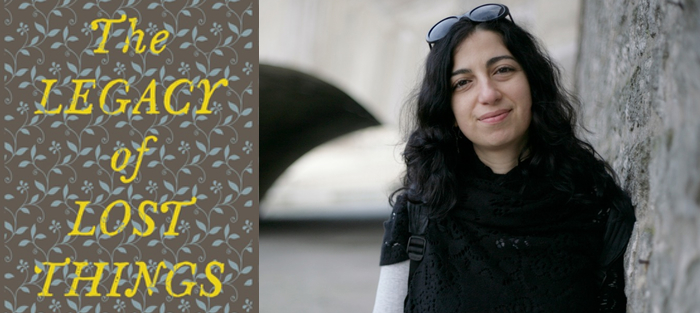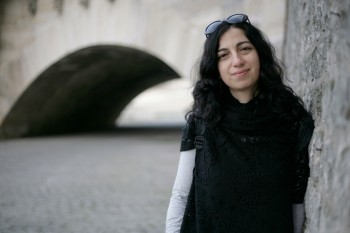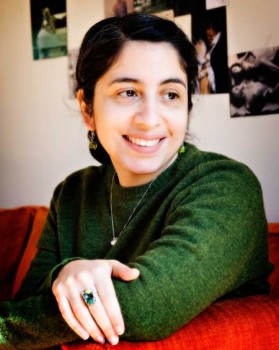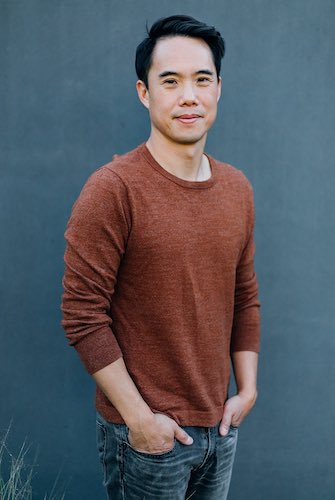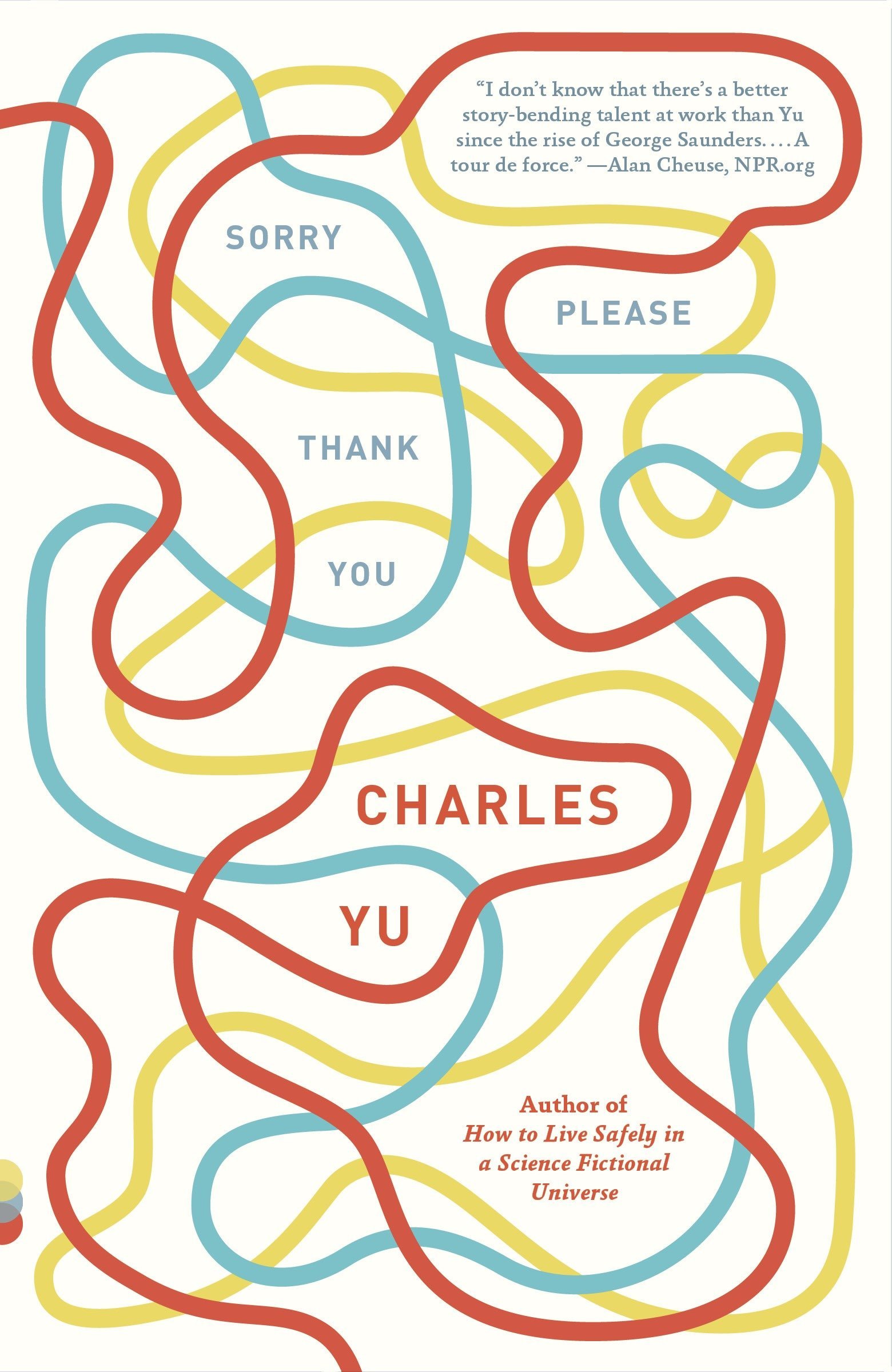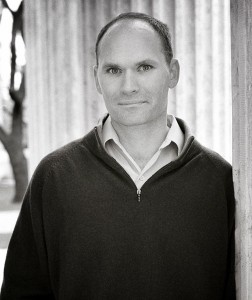After I read The Legacy of Lost Things, Aida Zilelian’s debut novel, published this month by Bleeding Heart Publications, I was dying to talk to her about it. Aida had given me the book at my New Year’s Day party; the next day I eagerly read the whole tome, intrigued by the Armenian American family she had created on the page. I wanted to find out how she had such a clear-sighted vision of her characters and how she had woven their stories together so seamlessly.
The story follows the lives of the Yessayian family during a time when their teenage daughter Araxi goes missing. As she drives across the country with her friend Celeste, we discover the histories of Araxi’s family members. The narrative reveals the mistakes they’ve made and the regrets they must come to terms with. Traveling through time from Beirut and Bucharest to Queens, patterns of violence and shame repeat through the generations, but longing and love ultimately bind their stories together.
It was a surprise for me to read such a serious tale. I first met Aida when she read at Gartal, the Armenian literary reading series I organized at the Cornelia Street Cafe in Greenwich Village, in the aughts and beyond. Her work had me–and everyone in the room–in hysterics. Our paths have crossed many times since then in Armenian literary circles, the literary scene in Queens, and at Boundless Tales in Astoria, Queens, the reading series she founded. Over the years we have met up to talk about writing, publishing (her work has appeared in over twenty-five journals, including Per Contra, Red Fez, Wilderness House Literary Review, Theurgy, and others), teaching (she has taught grades 6 through 12), and the balance between writing and life. And whenever we meet, she never fails to crack me up with her sly observations.
Aida is the recipient of the 2014 Tololyan Literary Award for The Legacy of Lost Things and was a semi-finalist in the 2011 Anderbo Novel Contest for The Hollowing Moon. As a nonfiction writer delving into fiction, I proposed that I interview Aida so that I could learn about her creative process, but also so that I could connect the dots between her sense of humor and her great capacity to render characters of complexity. She agreed, and we scheduled some time to talk on the phone.
Interview:
Nancy Agabian: I’ve been seeing you read around NYC for probably a dozen years. In my memory, your work is incredibly funny and you’re a great performer. But The Legacy of Lost Things has such a serious tone and contains tragic characters. I was wondering what your take is on writing comedy vs. writing seriously?
Aida Zilelian: I think what really got me writing in a very comedic style was being turned on to David Sedaris. At the time that I was reading him, I had walked away from writing for a very long time, but suddenly my family members became easy targets. Unlike other writers who are comedic, however, I actually ran out of material, because how many family members was I going to ridicule? I think the comedic aspect of my writing was like my warm up, the pre-writing, before I became a more dedicated writer.
So did you have an idea of how you wanted to be a writer, before you became serious about it?
No, I didn’t. I wrote for so long in high school, and I never really took it seriously. And then I played music for over ten years, so I was writing lyrics with a lot of intentionality, and that was my writing outlet. And then I decided I needed to start performing the music. It was exciting to be onstage, but it lost its luster for me by the time I started writing stories. And then I just said, “Let me see if I can get a story published.” That was my start. I certainly didn’t think I would reach a certain goal or this point in a writing career. But then one story led to the next, and I wrote a collection of [as yet unpublished] humorous short stories, so my writing developed from there.
It’s interesting that you bring up writing songs, because when I think of the language in Legacy, it is very direct; it’s not adorned language. But it’s very powerful. Do you think lyric writing has influenced your style?
It’s funny because my last story that was published was in Per Contra. And [poet and translator] Aaron Poochigian, whom I think you know, was published in the journal as well—it was a happy coincidence—and he commented on Facebook that my piece was written with concise, sparse prose, something to that effect. I had no idea I wrote like that.
It works well emotionally: the language in the novel is also straightforward, but it gives you room to be suspenseful, and it shows other layers, especially of longing. Also, the book is so well structured. You reveal the past of each character, in a very complex way, going back and forth in time alongside the story of Araxi’s road trip in the present. I was wondering how this tight structure came about, and how did it influence your writing?
Well, it’s kind of cliché, but it did feel like I was working with a bunch of puzzle pieces. I could place them however I wanted to create whatever image I wanted. The trick was placing them in a careful way so that everything could come together in the end. It was very difficult, actually, because I didn’t want to give away too much information about a character too quickly. I had the perspective of each character that I was working through, as well as the past and the present, and the individual stories had to tie together in a delicate way so that you, as the reader, could feel comfortable judging each character. But you could also feel comfortable forgiving them, or perhaps allowing the characters to redeem themselves.
You start with the fact that Araxi is missing, so it’s tempting as a reader to think, “Oh, this story is all about Araxi.” It’s refreshing to then discover that it’s about all three generations of her family. But I wonder if at some point Araxi had a more central role…
The difficult part of this is that I did write a young adult novel about Araxi, The Hollowing Moon. It received some attention—it was one of the top three finalists in the Anderbo Novel contest. And that novel is all about Araxi. It’s all about her road trip, her journey—I hate that word—but her whole process of leaving. I’m hoping that novel eventually gets published. It is a young adult novel, that’s true, but it still gives you a very good glimpse of Araxi. So in writing Legacy, I couldn’t step on the toes of the plot of the first book. I had to keep in mind that there was a chance The Hollowing Moon would get published and then it would all come together because then you could see the story through her eyes, as well.
Did you hear the news about Harper Lee’s latest novel?
Yes, I did. It’s crazy, the irony of it all.
It’s similar, right? She wrote this “re-discovered” novel first, got feedback to write about the childhood of the main character, which she did, and the result was To Kill a Mockingbird. It’s almost like you did the opposite of Harper Lee.
It’s true, and I hope that despite the fact that it’s young adult that it does receive attention at some point, because it puts the pieces of the story together more fully. I couldn’t just say, “Oh, this book isn’t going to get published, I might as well delve into Araxi’s story in Legacy.” I didn’t have the heart to do that; I couldn’t accept that the first book would never see the light of day in the publishing world. So I’m going to sit tight for now with that.
How did you decide to start the book with her being absent?
I learned this from being a teacher as well as a reader, that without an immediate conflict, there’s little reason to read on. It was definitely intentional to do that, because you want to know right away what the story is about. That was the premise, to establish the conflict and pull away from it, and then go deeper into the other characters, and let that conflict hover. So hopefully the reader becomes interested in reading the rest.
Your treatment of the characters was interesting. Like you said, we learn about their history and their flaws. I was wondering what books or characters inspired your approach.
I would say Khaled Hosseini’s writing has definitely influenced mine, from a cultural standpoint. And JD Salinger’s writing has inspired me. He’s probably inspired every writer I know, I bet. Because he just has a way of delving into a character, so fully, and so wholly, and so originally.
It’s interesting you mention Hosseini. What stays the most with me about The Kite Runner is the way that story continues across countries, the way characters carry their history with them.
What I got from it were their flaws. You read about this father who seems perfect, and the truth is, he’s not so perfect. And you do see characters who are purely evil, and you have to accept that. And then there are characters like the speaker, who is extremely flawed, and is really looking for some kind of redemption. That’s what helped me with my character development, at least.
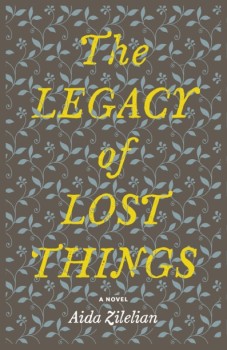 I think the character that I felt the most conflicted toward in your book was Levon [Araxi’s father]. It feels like insecurity really drives him, and eats him away to do horrible things. But at the same time he has a moment with Sophie [Araxi’s younger sister] when she’s at a particularly trying time, when he is really there for her. That was interesting to me.
I think the character that I felt the most conflicted toward in your book was Levon [Araxi’s father]. It feels like insecurity really drives him, and eats him away to do horrible things. But at the same time he has a moment with Sophie [Araxi’s younger sister] when she’s at a particularly trying time, when he is really there for her. That was interesting to me.
It can be easy to vilify. It was a difficult book for me to write, because I remember a writing professor telling me we either vilify or deify our parents. And sometimes we just have to take them off the pedestal to take a look at them, and look at them straight in the eye, to look at them wholly.
Has being a parent influenced you to write the parental characters more fully because you’ve taken on a different role in your life?
Probably unconsciously. I definitely wasn’t thinking as I was writing, “Oh, I have my six-month-old upstairs taking a nap.” It didn’t shift perspectives for me on a conscious level, but you do start to realize how difficult it is to be a parent. You start to become less rigid about the criticisms of your parents.
The epigraph of the book contains lines from Baruir Sevag’s poem “The Analysis of Longing.” It feels like every character has their own sense of longing that drives them. When in your process did you realize you were writing a book about longing?
To be honest I didn’t realize it till after I finished the novel. You know when you dream something, and you’re like, “I had such a weird dream,” and as you’re saying the words out loud, you realize what the dream was actually about. When I read through the final version, I realized it then. It was similar to someone trying to catch their shadow but they don’t know any better. It’s like “The Myth of Sisyphus”—he pushes the boulder up the hill and it rolls back down. It was Sisyphus’s passion but also his foil, and he just does it over and over again, the senseless upwards repetition. I thought about that and it just felt like for each of the characters there was something so hopeless in their longing, because they didn’t know how to…not fix themselves, but how to be at peace with who they were.
I grew up with a lot of Armenian poetry, a lot of which I lost touch with because I broke off from the community a really long time ago. And I just felt like, this is who I am, and it has influenced this, and I want to go back to the writers that I was taught in school. And that’s why I chose Baruir Sevag, because I grew up with his poetry, and I wanted to find something just fitting enough that it could be communicated in the novel.
It’s lovely to hear how that Armenian literary education seeped into you and is a part of you as much as anything else. And how it came out in the writing.
It’s now 100 years since the Armenian genocide took place, and there’s such a range of feeling about that, like anger about the denial, pride about the survival. And real determination to get acknowledgment and recognition. I’m sure there will be a lot of books, articles, and other production by Armenian writers. It was striking to me how your book doesn’t detail the genocide, but its presence is felt, and you are aware of it as a reader. Can you talk about that decision?
My grandfather, Garabed Zilelian, was orphaned in the genocide, and growing up I felt this absolute immense and overwhelming pressure to do anything I could to make up for the genocide, almost like it was my responsibility. And I became as a result…I won’t say desensitized, but I definitely have very strong feelings and strong reactions to the fact that there’s been no acknowledgment. You start feeling helpless. It’s like someone asking you to count every grain of sand on the beach, and you know it’s impossible, and it’s such a choking sensation. And it was put on me in many ways, very implicitly, and I broke away for that reason.
I didn’t associate with Armenians for a very, very, very long time. And yet there are ways that I am Armenian; it’s incorporated into who I am. It’s in my cooking, and I speak the language, my daughter speaks, and my husband on his own wants to learn to speak because he loves the language so much.
So when I wrote the book, I did not want it to be over-saturated with accounts of the genocide. Because, let me tell you, there are many details on my grandfather’s side, accounts of what he had to witness. But the third generation of the genocide survivors has not really been discussed. I really think that theme of escape, that theme of violence, that theme of grief, all of those emotions, runs through our veins. Another third generation Armenian might not agree with me in that capacity, but we really carried a lot. And there’s little fiction that depicts that inheritance.
In the novel, I touch upon the grandfather very briefly—that he escaped from the genocide, and he’s an abusive and violent man—and you see how his son becomes abusive and violent, and you see how Araxi’s mother needs to escape, and Araxi herself needs to escape. And it’s just an awful system of regurgitation of all these negative reactions to an awful thing that happened.
As you were talking, I was thinking of the work of Nancy Kricorian and Micheline Aharonian Marcom, and how they’re both working in a series format, where the first novel is about the genocide, and the others detail the subsequent years and generations. And yet their books directly on the genocide get the most attention. I wonder why that is?
I think it’s because there’s this unquenchable desire to feel validated, and for every book that’s published it’s one elusive step toward feeling validated. That this happened. Look, here’s another person writing about this. I don’t think that Armenians savor the gory details, but they feel more resolved to have it acknowledged.
But these books have found a wider audience. Maybe everyone hungers for acknowledgment in some way? I wonder who you think of as your audience.
My audience? Anyone who has a strong cultural background that they feel connected to. I would say female readers would have more interest. And even in some capacity, young adults.
I know you mentioned that you’re working on your next book. Does it too feature Armenian characters?
There are two different bodies of work I’m considering working on right now. One I have already started, which is based on the character Sophie from Legacy. In general, I tend to borrow characters from short stories, or in this case my novel, and continue along the idea of developing a particular character more fully. I want to continue focusing on the first-generation Armenians right now. I don’t think it’s been touched upon enough because the focus has understandably been the Genocide survivors. The second novel I have in mind will span time back to Armenia right before the Genocide and how a family manages to escape and come to America. It’s important to look at not only the survivors of the Genocide, but also for those Armenians who escaped and how that experience affected them—having to abandon their life, their family, and the conflicted feelings of surviving at the cost of what they have to sacrifice.
I love that you’re continuing the Yessayian family stories. And that you are uncovering stories that haven’t been told yet—the same way that Legacy breaks silences. And I can’t wait to read them both. Thanks so much for speaking with me.
No, thank you, so much Nancy, please. This was wonderful.

